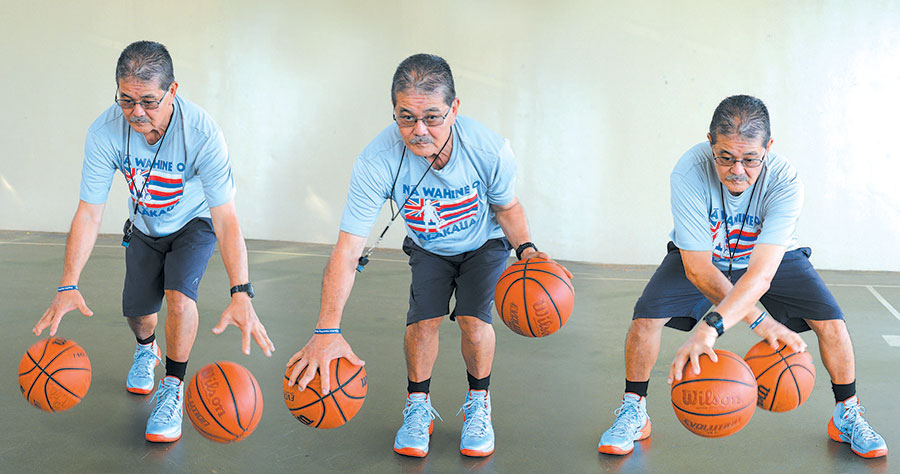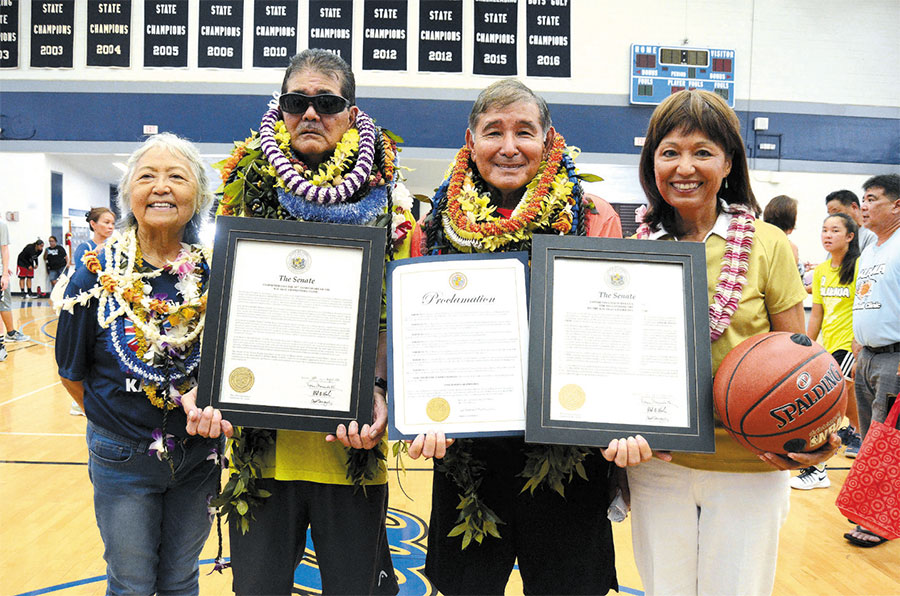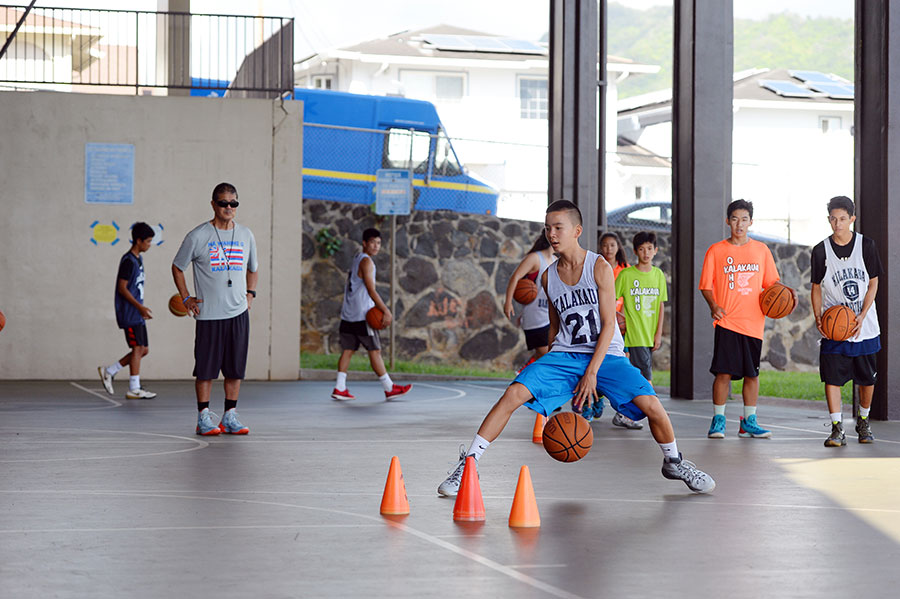Hoops Hero

After 50 years of coaching youngsters, Dennis Agena of Kalakaua Basketball Clinic still has amazing ball-handling skills, and thousands of his former students remain big fans.
Every interview I’ve ever done with Dennis Agena begins the same way. “It’s not about me; it’s about the kids,” he reminds me. But I don’t have to be reminded. Virtually everyone associated with Coach Agena and his Kalakaua Clinic the past 50 years — and there have been literally thousands of kids and dozens of coaches who have been impacted by his basketball clinics — knows it.
“Be humble,” he reminds the kids at the end of each clinic session. I saw that reminder firsthand when my own children attended his clinic for many years.
“At the end, he would pull us all into a circle as a way of connecting and give us important life lessons,” my daughter Becky recalls. “The lessons were always about humility, about being a good student and being a good citizen.”
For 50 years, Coach Agena has taught his players to be the best they can be — in basketball and in life. “Commitment is key,” he says in his inimitable low-key style — serious and direct, yet gentle at the same time. “You have to be committed at home and to your schoolwork. You have to have a good attitude, treat your peers well and respect your team.”
His players, many of whom blossomed into all-stars in Hawaii and then onto impressive collegiate rosters all over the country, keep in touch.
“After I graduated from Princeton, I was offered a coaching job at Samford University. The first person I called to ask what I should do was Coach Agena,” says Elyse Umeda-North, a former All-State guard from Punahou, who played NCAA Division I basketball in the Ivy League and now runs a successful business in Honolulu, CrossFit 808.
“Dennis Agena is arguably the most influential figure in Hawaii basketball over the last few decades,” says long-time local high school coach Byron Mello. “His fingerprints are all over the Hawaii high school game. When watching a game, you can pick out the Kalakaua players right away not only for their refined skills, but also the way they play the game. They play the right way —
they compete hard and always give their best effort, but they also respect the game and show humility in victory and resolve in defeat.”
Some of those he impacted over the years, like Derrick Low, Bobby Nash and Kyle Pape on the boys’ side, and Nani Cockett, BJ Itoman, Shawna-Lei Kuehu and Brandy Richardson on the girls’ side, can’t say enough about him.
“Although basketball was our connection, Coach Agena instilled a work ethic in me off the court that I am proud of today,” says Richardson, a former star from Kalaheo and UC Santa Barbara, and now a teacher at Radford High School. “He presented so many opportunities to play at big-time tournaments in front of big-time coaches and against big-time players.”
“Coach Agena recognized early that, in order for many of us to have a chance to play ball beyond high school, we had to go to big tournaments on the Mainland. We went to national tournaments in Vegas and Oregon and Washington. And it really made an impact, as many of us were offered college scholarships because of that exposure,” says my daughter Becky, who played her college ball at
Loyola Marymount and then Columbia before coaching for several years in Connecticut and Virginia. “At every place I coached, the first thing we did were the drills I learned at Kalakaua from Coach Agena.”
Dennis Agena was born and raised in Honolulu, the son of Okinawan immigrants. “My dad worked in the fields on Maui before going back to Okinawa, and then he came back to Hawaii to marry,” Agena says. The family lived in Kalihi and his dad became a local chef. But tragedy struck when Agena was in grade school and his mother died. He and his brothers were split up among aunties and uncles. “It was a hard life. I went to live in Papakolea,” he says. “My aunt and uncle, Doris and Yoshi Arakaki, were very supportive.”
Agena attended Farrington High in the 1960s, where he played volleyball and basketball and ran track. He was good enough in basketball to earn a starting point guard spot on the Governors’ varsity team by his senior year. “I wasn’t a great shooter, but I loved ball-handling and passing,” he recalls.
His team-oriented style of play and his low-key demeanor made an impact on the coaches he played for at the Kalakaua gym. One of them, an assistant by the name of Saburo Kondo, was suffering from cancer. Agena went to visit him at the hospital, where the coach confided in him that he thought he was the one player who could keep the community basketball program going. “I told him I would do it,” Agena recalls.
Then only 18 years old and only a few weeks after graduating from high school, in 1966 Agena started what would become Kalakaua Basketball Clinic. “Only a handful kids showed up,” Agena recalls. One of them was Blane Gaison, who would go onto become a star football player at Kamehameha, University of Hawaii and the NFL. But with Agena’s help, Gaison would develop into a great basketball player, too.
“From that first group, many went on to star at Kamehameha and Punahou, and they told their teammates about the clinic, and so the word got out from there,” Agena says. Over the years, the all-state teams in Hawaii were littered with the outstanding ball-handling wizards from the Kalakaua clinic.

State Sen. Donna Mercado Kim (far right) presented proclamations to coaches Dennis Agena (second from left) and Myles Akamine of Kalakaua Basketball Clinic, pictured with Leilani Agena PHOTO BY DUANE IKEDA
“Even though I’m 68, I can do all the drills myself,” Agena says. And that’s not a break from his instruction of being humble — that’s just a fact. Over the years, he taught the skills he perfected to teams he coached at Punahou, Iolani, Kamehameha, Kalani and Kahuku, and on the Neighbor Islands at Honokaa and Molokai. Except for a brief stint as a head intermediate Division II coach at Punahou, he always was an assistant. “I like working behind the scenes,” he says.
His dedication to basketball impacted his personal life, too. Twenty years after starting the weekend clinics at Kalakaua, he was so involved in the sport that he had no time for relationships. Then, along came Lani — and his life changed forever.
“I was working for United Airlines customer service and I had just moved back to Oahu, when I went to my hairdresser,” Lani Agena says. “She told me her cousin went to the Kalakaua clinic all the time, and often brought home Coach Agena for dinner on Sunday night — he was always alone. One thing led to another and they set us up on a blind date.”
It turned out to be love at first sight — or perhaps at first sound.
“It took him a couple of weeks to build up the nerve to call me, but when he did we must have talked for about an hour. We had graduated from high school the same year: 1966. He was from Farrington and I was from Kaimuki, and we knew so many of the same people.
“Three months later, we were married!”
And for the past 29 years, Aunty Lani, as all the players at the Kalakaua clinic affectionately know her, is there for every basketball session and every game.
“We’ve worked with thousands of kids over the years,” she says with a smile. “Because of my airlines pass, we’ve gone to games all over — to Washington State and Harvard and Yale and Bryn Mawr and Tufts — you name it, we’ve probably been there. When we see the kids finish their education and become good citizens, we know its all been worth it.”
With Lani helping with much of the logistics, and Agena and his volunteer coaches running the camps, the clinic has evolved into Kalakaua Foundation.
“We want to continue the legacy of helping kids by eventually giving scholarships,” she says. “We’re setting a 50-year celebration event with many of his former players, Hawaiian food and, of course, a chance for Dennis to come in shorts and slippers — no long pants for him.”
The details of that celebration are still being worked out, but you can bet that it will be fitting for a great coach who has given so much of himself to the kids of Hawaii.
For more information, visit kalakauafoundation.org.






